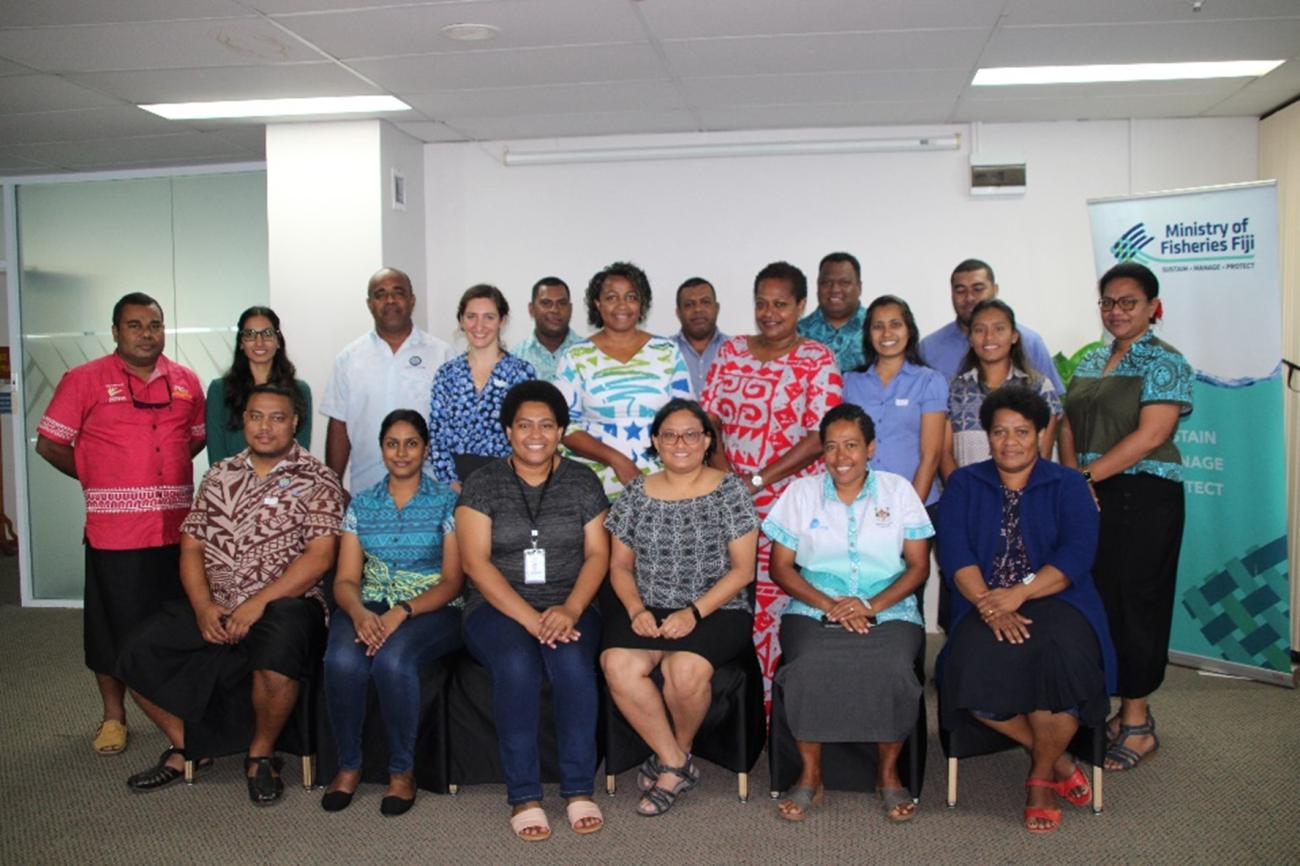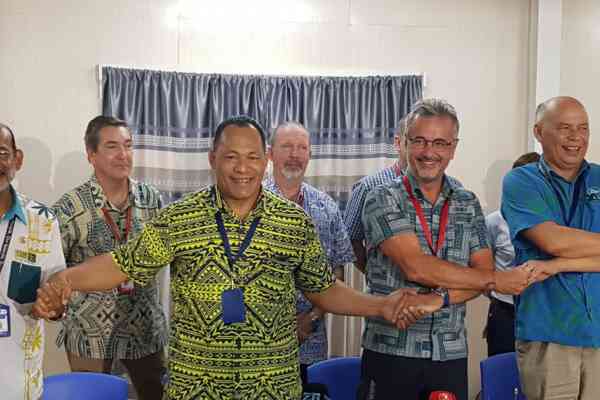A specialised training in gender equity and social inclusion has provided fisheries officers an opportunity to strengthen knowledge of gender concepts and build their understanding on gender equality and social inclusion.
This training was facilitated by Sangeeta Mangubhai Principal Consultant from Talanoa Consulting and Natalie Makhoul SPC Gender and Human Rights Specialist for the PEUMP Programme. Margaret Fox, Human Rights and Social Development (HRSD) SPC adviser also supported the training planning and led a session on inclusive community engagement methods. Emily Kamoe from the Fiji Ministry of Women, Children and Poverty Alleviation also led a session on the Gender Transformative Institutional Capacity Development Initiative, which aims to enhance technical knowledge, competence and resources on transformative gender mainstreaming across various government institutions, sectors and settings in Fiji..
This first of two in-person training sessions aimed at building the confidence and technical capacity of the Ministry of Fisheries to understand concepts and ideas of gender equity and social inclusion, and how these apply in the fisheries sector. The training provided participants with practical tools on ‘how to’ bring social and human dimensions into the focus of fisheries, particularly around disaster risk reduction, to ensure no one is left behind.
Senior fisheries and fisheries officers across technical (i.e., inshore fisheries management, offshore, aquaculture, research) and geographic (i.e., Central, Eastern, Northern, Western) divisions within the Fiji’s Ministry of Fisheries were part of this 2-day training that took place in October 2022. The training included a series of interactive activities, including an attitude survey, a “gender fishbowl” exercise to increase participants’ awareness on how gender impacts and influences their life and why it matters and presentations on gender equality as a development goal and a human right.
During group exercises, participants were also able to transfer learnt concepts and tools and critically discuss missed Gender Equality and Social Inclusion Strategy (GESI) considerations in past and current projects.
Training facilitator Natalie Makhoul said the training aims to build capacity of fisheries practitioners to apply a GESI lens while equipping them with tools and ideas that can be easily applied in the field or at policy level. Allowing space and time for critical reflection and self-awareness on personal biases and stereotypical thinking was crucial.
SPC continues to work in the region to support these trainings as capacity development within the fisheries sector, to ensure fisheries staff are gender aware and sensitive and ensure they are better equipped with knowledge, tools and processes to apply GESI concepts into coastal fisheries.
Sangeeta Mangubhai said, “This is part of a broader piece of work to support the Ministry integrate disaster risk reduction into their projects and programmes. However, to do that, there is a need to first understand and unpack why gender is relevant to fisheries, including the way it manages disaster as well as climate change risks.”
In total, 14 women and 9 men took part in the training, including 3 project staff from the Food and Agriculture Organization of the United Nations, Fiji office. To achieve improved capacity building results the facilitation team recommended participants to attend the upcoming series of training, which will build on the foundational knowledge on GESI provided and will focus on Disaster Risk Reduction.
This training was made possible through a partnership between the Food and Agricultural Organization of the United Nations and the Pacific Community’s , with funding from the Government of Canada through the CANADAPT003 project, and funding from the European Union and the Government of Sweden, through the PEUMP programme.
About SPC:
The Pacific Community has been supporting sustainable development in the Pacific, through science, knowledge and innovation since 1947. It is the principal intergovernmental organisation in the region, owned and governed by its 27 member countries and territories. www.spc.int
Follow SPC News | Facebook | Twitter | LinkedIn | Instagram | YouTube and subscribe to SPC's Newsletter
About CANADAPT003:
The Food and Agriculture Organization of the United Nations is implementing the project titled strengthening small-scale fisheries in the Pacific Islands (Canadapt 003). Funded by the Government of Canada, the project has a long-term vision of improving the resilience of coastal communities in Fiji, the Solomon Islands and Vanuatu through improved capacity to adapt management of nearshore resources to climate change and by reducing vulnerabilities including through a focus on gender equity. The intended impact of the project is increased resilience of fishers (both women and men) in coastal communities vulnerable to the impacts of climate change. Food and Agriculture Organization of the United Nations is working through national and regional partners and experts in the Pacific Region, in close coordination and partnership with the Fiji Ministry of Fisheries, the Solomon Islands Ministry of Fisheries and Marine Resources, and the Vanuatu Ministry of Agriculture, Livestock, Forestry, Fisheries and Biosecurity.
About PEUMP:
The Pacific-European Union Marine Partnership (PEUMP) Programme addresses some of the most serious challenges faced by Pacific countries. Among these are the increasing depletion of coastal fisheries resources; the threats to marine biodiversity, including negative impacts of climate change and disasters; the uneven contribution of oceanic fisheries to national economic development; the need for improved education and training; and the need to mainstream a rights-based approach and to promote greater recognition of gender issues to ensure inclusiveness and positive changes for Pacific island people. The seven-year PEUMP programme is funded by the European Union (EUR 35 million) and the government of Sweden (EUR 10 million). It is implemented by the Pacific Community (SPC), the Forum Fisheries Agency (FFA), the Secretariat of the Pacific Regional Environment Programme (SPREP) and the University of the South Pacific (USP) in close collaboration with Non-Government Organisations and the national authorities.

